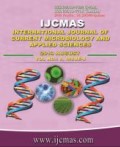


 National Academy of Agricultural Sciences (NAAS)
National Academy of Agricultural Sciences (NAAS)

|
PRINT ISSN : 2319-7692
Online ISSN : 2319-7706 Issues : 12 per year Publisher : Excellent Publishers Email : editorijcmas@gmail.com / submit@ijcmas.com Editor-in-chief: Dr.M.Prakash Index Copernicus ICV 2018: 95.39 NAAS RATING 2020: 5.38 |
The gut micro flora plays vital role in health status of the host. Human physiology and nutrition are greatly affected by the majority of microbes living in the gut. The most dominant phyla, making up to 90 percent of the total microbial population in humans are Bacteroidetes and Firmicutes followed by Actinobacteria Proteobacteria, Tenericutes, and Verrucomicrobia. The multiplication and establishment of gut microbiome begins at birth, but the alteration in composition of the microbial community depends upon various factors such as the age, gender, genetic composition, geographic location, environmental factors, diet and health status of an individual. Therefore it is of prior importance to study and understand the composition of gut microbiome of different ethnic groups. The gut flora has a major role in maintaining the homeostasis by controlling nutrient metabolism, metabolic pathways, synthesis and excretion of vitamins, preventing colonization by pathogens, maintenance of intestinal epithelial barrier function and development of systematic and mucosal immune response. It has been suggested that decrease in density, diversity and activity of gut microbiota (or dysbiosis) can lead to many diseases such as obesity and metabolic syndrome, cancer promotion, inflammatory bowel disease (IBD), encompassing ulcerative colitis (UC) and Crohn’s disease (CD), irritable bowel syndrome such as constipation, diarrhoea and bloating. The latest researches has revealed new candidate organisms among healthy gut microbiota that are beneficial to gut health and new strategies and individual based therapeutic treatments for correcting dysbiosis occurring in different disease conditions. Constructive modulation of gut microbiota through potential therapeutics such as prebiotics, probiotics, antibiotics and faecal transplantation are a promising clinical target for many diseases including obesity, diabetes, cardiovascular disease, inflammatory bowel disease, allergy and protective immunity against infections. Many national and international projects and companies are focussed on studying the microbial communities and the specific roles they play in human health and diseases.
 |
 |
 |
 |
 |